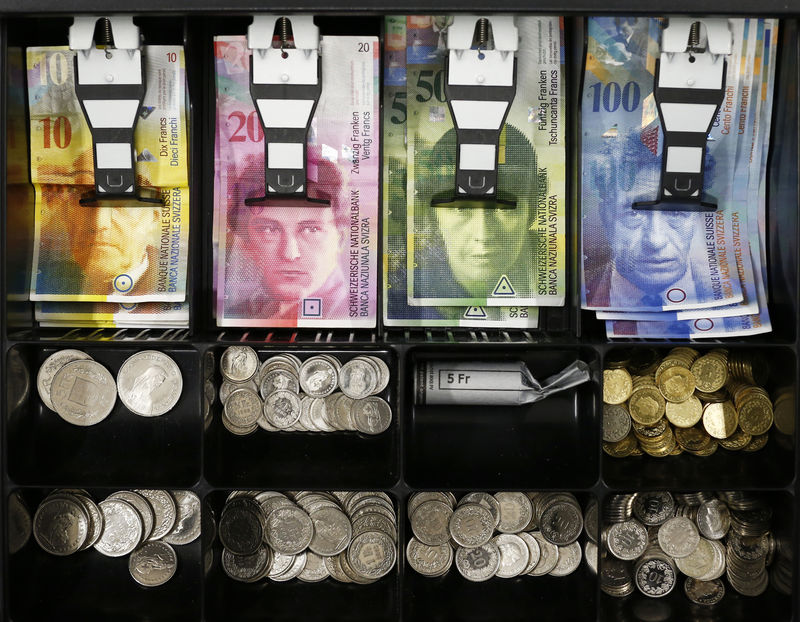 © Reuters. FILE PHOTO – Swiss franc coins are seen in a cash drawer in this picture illustration in Bern
© Reuters. FILE PHOTO – Swiss franc coins are seen in a cash drawer in this picture illustration in BernBy John Revill
ZURICH (Reuters) – Rising global trade tensions could buffet the Swiss franc, Swiss National Bank Chairman Thomas Jordan warned on Wednesday, adding Switzerland would be among the countries hardest hit if full-scale trade war broke out.
If higher tariffs made consumers and producers expect steadily rising prices, this could force central banks to tighten monetary policy to head off inflationary risks, Jordan said. They could also lower interest rates to stimulate economies facing slower growth as long as inflation stayed steady.
The tensions could have an impact on the Swiss franc, he said, although how the safe-haven currency would react would be difficult to predict.
“Would our currency be sought as a safe haven in the event of a trade war?” Jordan asked in remarks prepared for a speech in Bern.
“Or would it even come under downward pressure given that Switzerland, as a small, open economy, would face particularly strong exposure to a severe contraction in world trade?”
The United States has already imposed tariffs on $250 billion worth of Chinese goods, and China has responded with retaliatory duties on $110 billion worth of U.S. goods.
U.S. President Donald Trump warned China this week that he was ready with billions of dollars of new tariffs if a trade deal between the two companies is not reached.
The marked increase in uncertainty has so far not had any lasting influence on the value of the franc, Jordan said.
“However, it could be a different picture if there were to be a trade war,” he said.
The trade disputes were endangering the global upturn by denting confidence and triggering upheaval on financial markets, he said.
“Although it is difficult to estimate the negative impact of a worldwide trade dispute on global GDP, there can be no question that a full-scale trade war would weigh heavily on the world economy,” Jordan said.
“All countries would feel the detrimental effect of a global trade war, but small, open economies such as Switzerland would
be among those hardest hit.”
Jordan said the current tensions also made it more difficult to conduct monetary policy.
“A wave of protectionism would create a lot of uncertainty, be it with regard to the short-term development of the real economy and prices, or with regard to the longer-term macroeconomic context,” he said.
“The risk of monetary policy mistakes would increase, at least while the economy is in the process of adapting to the changed market conditions.”
Fusion Media or anyone involved with Fusion Media will not accept any liability for loss or damage as a result of reliance on the information including data, quotes, charts and buy/sell signals contained within this website. Please be fully informed regarding the risks and costs associated with trading the financial markets, it is one of the riskiest investment forms possible.
Source: Investing.com




























